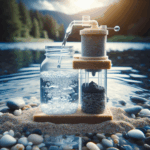The Art of Foraging: A Sustainable Way to Connect with Nature
Foraging is an ancient practice that has been gaining popularity in recent years as a way to connect with nature, source fresh and local ingredients, and reduce our reliance on industrial agriculture. This sustainable and environmentally-friendly activity involves gathering wild plants, mushrooms, and other edibles from the natural landscape.
Foraging is not only a way to source free, nutritious, and delicious food, but it is also a way to deepen our connection to the natural world. When we forage, we become more attuned to the seasons, the cycles of nature, and the diversity of plant life around us. It allows us to slow down, observe our surroundings, and appreciate the beauty and abundance of the natural world.
One of the key benefits of foraging is its sustainability. By harvesting wild plants and mushrooms, we reduce our reliance on industrial agriculture, which can have negative impacts on the environment, such as deforestation, habitat destruction, and soil degradation. Foraging also promotes biodiversity by encouraging the preservation of native plant species and ecosystems.
In addition to its environmental benefits, foraging can also have positive impacts on our health and well-being. Wild plants and mushrooms are often more nutrient-dense than their cultivated counterparts, as they have had to adapt to their natural environment and develop strong defenses against pests and diseases. Foraging can also be a great form of exercise, as it often involves walking, bending, and stretching to reach and gather edible plants.
However, it is important to approach foraging with caution and respect for the environment. It is crucial to properly identify plants and mushrooms before consuming them, as some species can be toxic or harmful if ingested. It is also important to forage responsibly, by only harvesting what you need, leaving some behind for wildlife and other foragers, and not damaging the ecosystem or its inhabitants.
For those interested in trying their hand at foraging, there are many resources available, such as guidebooks, workshops, and online communities. It can also be helpful to go foraging with an experienced guide who can teach you how to identify edible plants and mushrooms, as well as how to harvest them sustainably.
Overall, foraging is a wonderful way to connect with nature, source fresh and local ingredients, and reduce our impact on the environment. By embracing this ancient practice, we can deepen our relationship with the natural world, promote sustainability, and enjoy the many benefits that foraging has to offer.



